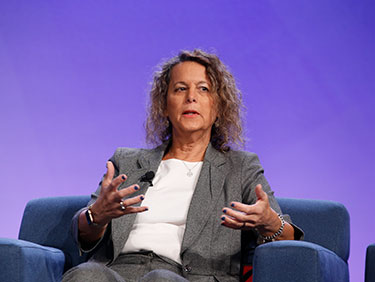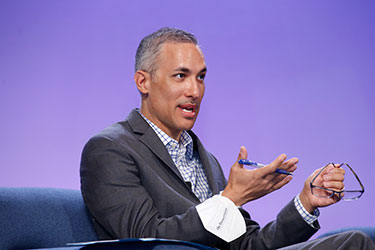Despite many successes during the COVID-19 pandemic, U.S. public health made mistakes in messaging, relationship-building and sometimes in attitude that hindered care, panelists said during the APHA 2022 session “Where Do We Go from Here?” on Wednesday.
“When approaching others, you have to start from a place of respect,” said Marissa Levine, professor of public health practice at the University of South Florida. “It is only then that you can connect.”
While masks and other safety protocols were effective, and the vaccine’s quick development and efficacy is viewed as a scientific triumph, public health stumbled at times in its interactions with people who were vaccine hesitant or caught in misinformation. 
The panelists critiqued areas for improvement, while also exploring how to widen the public health workforce pipeline.
Levine, former commissioner of the Virginia Department of Health, said that as commissioner she learned to work across the political aisle and understood that relationship-building was key to success.
A problem with the pandemic response was that many public health officials had not established prior relationships with local business owners, school leaders and politicians, she said. So when public health officials mandated business and school closures, there was pushback. Had all parties had positive relationships already in place, smoother interactions may have resulted.
Levine always hesitated to declare mandates when she was Virginia’s health commissioner, she said.
“We have to be really careful about our authority,” Levine said. “Mandates are difficult (for the public), and we have to be humble when we use them.”
To avoid public pushback, relationships need to be established before disaster strikes, said session moderator Brian Castrucci, president and CEO of the de Beaumont Foundation.
“You need a relationship before the disaster,” Castrucci said. “Public health is a team sport. When the disaster hits, you already know how to talk to each other. But we did not talk to our ‘patient’ (business owners, school authorities) until the operation was happening. We have to own what we did.”
Daniel Dawes, executive director of Satcher Health Leadership Institute at Morehouse School of Medicine, has lobbied for state health policies in Georgia. This year, his work helped pass HB 1013, known as the Mental Health Parity Act, which bolstered health insurance coverage for mental health and substance abuse in the state.
Dawes learned how to maneuver in a partisan political landscape.
“Relationships matter,” he said. “Trust matters. Over time, we were able to develop that relationship, know what they wanted, what we wanted. There were times I thought I was a closeted Republican.”
 Panelists also talked about broadening educational pathways to a public health career.
Panelists also talked about broadening educational pathways to a public health career.
Community health worker programs, in which residents of vulnerable communities are trained by a health agency for public health jobs in their community, have proven successful. Key to success has been that the public health practitioners are known in and trusted by the community.
Panelists discussed a similar avenue: building up community colleges to train local public health workers. Students could graduate with little or no debt and have a firmer connection to the local community than someone coming in from an outside higher education institution, said Perry Halkitis, dean of the School of Public Health at Rutgers University.
“To effect change in a community, you should go to your local school,” Halkitis said. “You do not have to go to the expensive schools and go into debt. Our school is always looking to collaborate with small colleges to work in communities.”
The workforce also needs to be trained better in messaging, communication and interacting with people who have other views.
“We forgot those (skills during the pandemic) because it was just about the virus,” Halkitis said. “And that is where public health got it really wrong.”
Photos from top: Marissa Levine and Daniel Dawes. Photos courtesy EZ Event Photography.